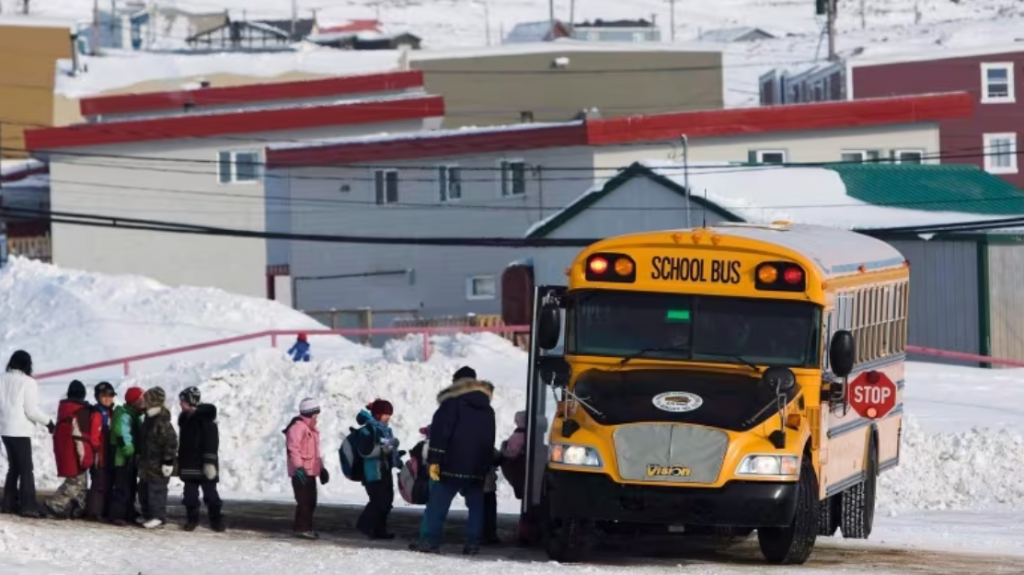Nunavut’s new school violence reporting system was underused in its 1st year

The first year of Nunavut’s new school violence tracking system saw the database underused, and many teachers who were tasked to use it lacked the training to do so, according to Nunavut’s teacher’s union.
In October 2022, the department of education launched its long-awaited school violence data tracking system. Some nine years in the making, the database is intended to standardize school violence tracking across the territory and give policymakers a more accurate picture of the issue to help allocate resources to address it.
In its infancy, the database tracked 362 incidents of violence, and 48 reports of property damage — numbers which both the department and the Nunavut Teachers’ Association (NTA) say do not capture the full scope of what actually transpired last school year.
“We’re seeing people are starting to become familiar with the system, and that’s a good thing,” said NTA president Justin Matchett.
“But it’s also showing us people are not really understanding what types of things we’re looking for.”

Matchett pointed specifically to incidents of discrimination or harassment, noting it’s a topic which the union deals with frequently in its office.
“We have seen an uptake in discrimination, usually race-based, within Nunavut over the last couple of years,” he said.
“That’s not something that has been reported on in the system.”
Notably, Matchett said as of last week, the system hadn’t generated any reports for this school year. At the time, 11 communities were into their fourth week of school, and another nine communities were into their third week.
“Maybe that’s just a really good thing and things have been running smoothly,” he said.
“But generally, from what we see, there would typically be a few reports by now. So we might need to refresh our members on the system and the importance of using it.”

Teachers waiting for training
The reported numbers from last year are a far cry from the frequency of incidents reported in a 2021 CBC News investigation, which counted more than 1,000 incidents of violence in Nunavut schools in the COVID-shortened 2019-2020 school year.
The investigation had school principals across Nunavut fill out a spreadsheet, created by CBC News, as part of an access to information request.
Nunavut’s department of education took CBC’s spreadsheet, and used it for the framework of its new tracking system.
While the system hasn’t yet accomplished its intended outcome — in helping policymakers direct resources to certain communities to address school violence — Matchett says it’s helped stir discussion at the joint GN-NTA Safe Schools Committee.
“We’ve been meeting regularly since the system has been online,” Matchett said. “We’re really looking at the numbers that come in but it’s also branching us into other conversations of what’s lacking in schools in terms of safety and violence prevention.”
Matchett said among those shortfalls is training, specifically how no training has been offered to teachers on how to deescalate or prevent violent situations in schools.
Though the Safe Schools Committee has identified the need for training, Matchett said the committee has yet to deliver any training programs to teachers — though he hopes the government has timelines for training delivery in place at the next committee meeting.
Still, Matchett said the committee was valuable, as the department of education showed genuine concern for the issues brought forward by the teachers.
“A lot of stuff when we talk about the union and the government is combative. But I will say this committee has been very good. I’m very happy to be part of it,” he said.
Nunavut’s department of education initially acknowledged CBC’s request for an interview for this story, but then went more than a week without responding to it, despite follow up emails.
After CBC’s deadline, a department spokesperson said they could not accommodate an interview “due to prior commitments” and instead sent a written statement highlighting the department’s work implementing mental health support programs.
Related stories from around the North:
Canada: Post-secondary education offered in Nunavik, Quebec would be a game changer, says school board, Eye on the Arctic
Greenland: Nunavut children’s books translated for circulation in Greenland’s schools, Eye on the Arctic
Sweden: Can cross-border cooperation help decolonize Sami-language education, Eye on the Arctic



